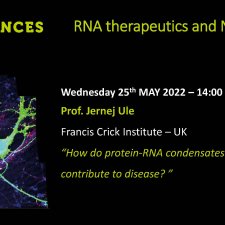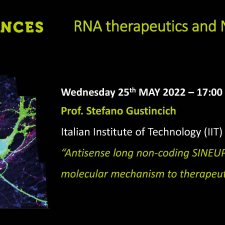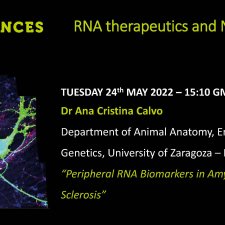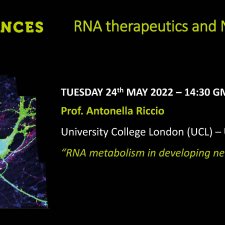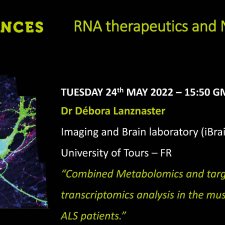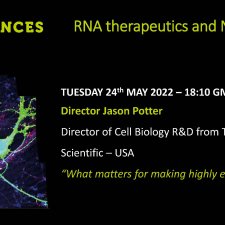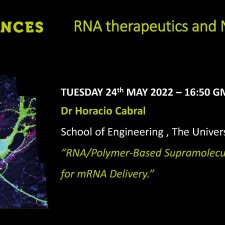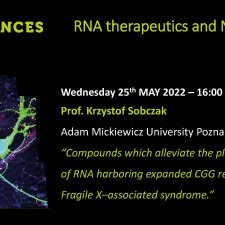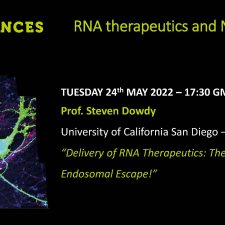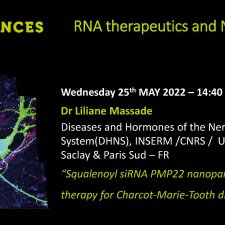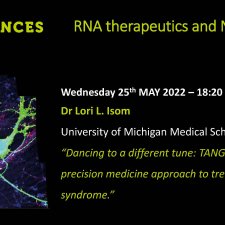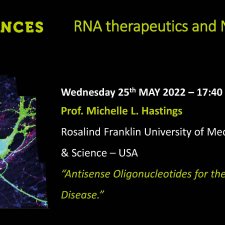RNA therapeutics and Neuroscience
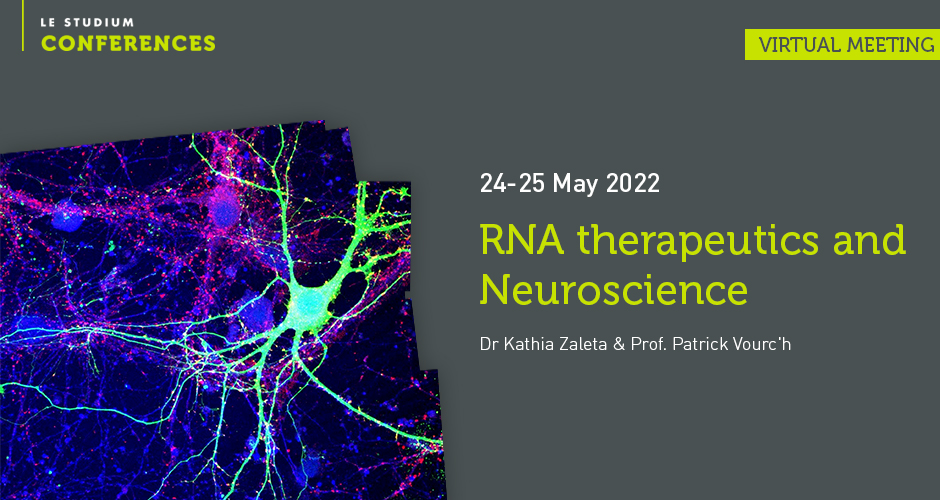
Descriptif
The RNA & NEUROSCIENCE meeting aims to bring together graduate students, academic and industry scientists working in the fields of RNA and the Central Nervous System (CNS) to present their latest research results, ideas, developments, biological medical applications and discuss the current concepts and the challenges that we are facing for future research.
RNA therapeutics is a novel technology that provides a unique treatment for a variety of diseases. While it has been a success for the COVID19 pandemic, the RNA community still has the challenge on delivering some of these RNA molecules in other parts of the body (e.g. brain and cardiac tissue) and better specificity to have a full therapeutic effect. Therefore, this meeting will explore the novel RNA therapeutics that are been currently developing and their mechanisms to cure a variety of diseases.
Additionally, the complexity of the brain provides a unique challenge to find therapeutics to cure neurodevelopmental disorders and neurodegenerative diseases such as Alzheimer’s and ALS. These diseases are characterized by the lack of gene regulation causing protein imbalance at the synapses and therefore cell death. Thus, in this meeting we will also explore the mechanisms that cause these diseases and the novel therapeutics that are currently being developed for their cure.
This international conference is organised in the framework of the BIOPHARMACEUTICALS ARD CVL Programme.and
Vidéos
Prof. Jernej Ule - How do protein-RNA condensates form and contribute to disease?
Mutations in many genes encoding RNA-binding proteins (RBPs) cause neurologic diseases, and especially the amyotrophic lateral sclerosis (ALS).
Prof. Stefano Gustincich - Antisense long non-coding SINEUP RNAs: from molecular mechanism to thera…
Natural SINEUPs are antisense long non-coding RNAs that enhance translation of sense mRNAs. Their activity depends on the combination of two domains: the overlapping region, or binding domain (BD),
Dr Ana Cristina Calvo - Peripheral RNA Biomarkers in Amyotrophic Lateral Sclerosis
Amyotrophic lateral sclerosis (ALS) is a neurodegenerative disease of unknown origin that causes progressive muscle paralysis and motor neuron death.
Prof. Antonella Riccio - RNA metabolism in developing neurons
Neurons are cells with a complex morphology, which maintain their cellular structure through the compartmentalized expression of proteins essential for growth and plasticity.
Dr Débora Lanznaster - Combined Metabolomics and targeted-transcriptomics analysis in the muscle of…
Amyotrophic lateral sclerosis (ALS) is a neurodegenerative disease characterized by the progressive loss of motor neurons, leading to paralysis and death of patients after 3-5 years of symptoms’ onset
Director Jason Potter - What matters for making highly expressed mRNA.
The need for high quality mRNA for therapeutic applications has grown substantially over the last few years due to the efficacy of the COVID mRNA vaccines.
Dr Horacio Cabral - RNA/Polymer-Based Supramolecular Approaches for mRNA Delivery
Messenger RNA (mRNA) therapeutics are attracting much attention, particularly after the approval of two mRNA vaccine formulations for COVID-19.
Prof. Krzystof Sobczak - Compounds which alleviate the pleiotropic toxicity of RNA harboring expand…
Fragile X-associated tremor/ataxia syndrome (FXTAS) is an incurable neurodegenerative disorder caused by expansion of CGG repeats in the FMR1 5'UTR.
Prof. Steven Dowdy - Delivery of RNA Therapeutics: The Great Endosomal Escape!
All macromolecular therapeutics, including ASOs, siRNAs, peptides, proteins, CRISPR, mRNA and non-viral DNA vectors, are taken up into cells by endocytosis.
Dr Liliane Massade - Squalenoyl siRNA PMP22 nanoparticles, a potent therapy for Charcot-Marie-Tooth…
Charcot-Marie-Tooth disease type 1A (CMT1A), caused by a duplication in chromosome 17, results in peripheral myelin protein 22 (Pmp22) over-expression and axon demyelination.
Dr Lori L. Isom - Dancing to a different tune: TANGO offers a precision medicine approach to treati…
Dravet syndrome is an intractable developmental and epileptic encephalopathy caused largely by de novo variants in SCN1A resulting in haploinsufficiency of the voltage-gated sodium channel α subunit
Prof. Michelle L. Hastings - Antisense Oligonucleotides for the Treatment of Disease
Antisense oligonucleotides (ASOs) have proven to be an effective therapeutic platform for the treatment of disease.

